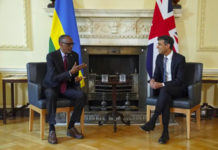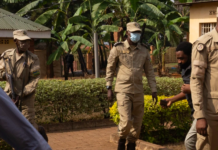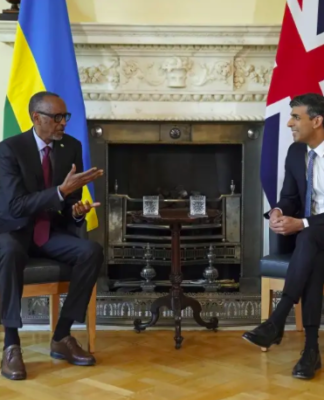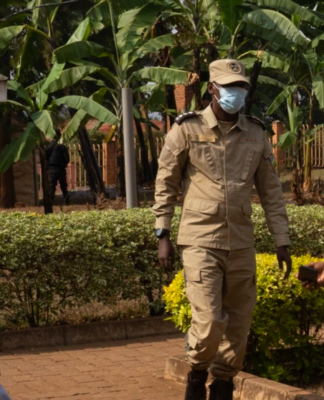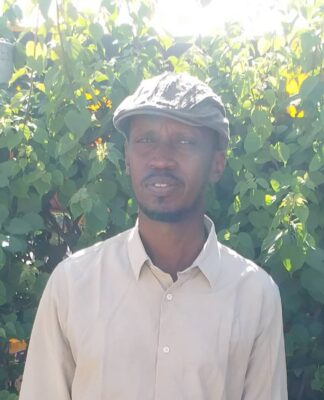GOMA, Democratic Republic of the Congo — Televised comments made by Amb. Susan Rice shortly after the attack on the U.S. consulate in Benghazi have dominated the debate over her probable nomination for secretary of state. This is a bit surprising, since it’s clear that she played only a marginal role in the affair and appears to have just been reading from the briefing notes provided. It’s also unfortunate that the “scandal” has crowded out a healthy discussion of her two-decade record as U.S. diplomat and policymaker prior to Sept. 2012 — and drawn attention away from actions for which she bears far greater responsibility than Benghazi.
Her role in shaping U.S. policy toward Central Africa should feature high on this list. Between 1993 and 2001, she helped form U.S. responses to the Rwandan genocide, events in post-genocide Rwanda, mass violence in Burundi, and two ruinous wars in the Democratic Republic of the Congo.
She did not get off to an auspicious start. During her first year in government, there was a vigorous debate within the Clinton administration over whether to describe the killing in Rwanda as a “genocide,” a designation that would necessitate an international response under the 1948 U.N. Genocide Convention. In a now infamous incident from that April, which was reported in her now State Department colleague Samantha Power’s book, A Problem from Hell, Rice — at the time still a junior official at the National Security Council — stunned her colleagues by asking during a meeting, “If we use the word ‘genocide’ and are seen as doing nothing, what will be the effect on the November [congressional midterm] election?” She later regretted this language, telling Power, “I swore to myself that if I ever faced such a crisis again, I would come down on the side of dramatic action, going down in flames if that was required.” And she has indeed emerged as one of the more forceful advocates for humanitarian intervention in U.S. foreign policy. Unfortunately, she has also often seemed to overcompensate for her earlier misstep on Rwanda with an uncritical embrace of the the country’s new leaders.
Rwanda was the most compelling, moving story out of the bunch. After a cataclysm of Dantean proportions — 800,000 people massacred in a hundred days — Paul Kagame’s Rwandan Patriotic Front was able to reduce crime in the country to the lowest levels anywhere in Africa; rebuild its economy, making it the one of the easiest countries on the continent to do business; and pioneer new ways of managing health care and dealing with genocide-related crimes. The word “phoenix” often comes up in conversations about Rwanda, and deservedly so.
It was in this context that Rwanda’s invasion of its much larger neighbor should be seen. In 1996, with the support of Uganda and a slew of other African countries, Rwanda invaded the Congo (then called Zaire) to root out the the Hutu militias that had attempted to exterminate the Tutsi population of Rwanda two years previously from the refugee camps where they had fled and were reportedly regrouping. After dismantling these camps, Rwandan forces along with Congolese rebels pushed all the way to the capital and overthrew longtime strongman Mobutu Sese Seko in May 1997.
Laurent Kabila, the president put in power by the rebellion, quickly fell out with his Rwandan backers — when he asked them to leave, they launched a new rebellion in the East, while Kabila recruited the very rebels that Rwanda had initially invaded the country to crush. On the face of things, Rwanda once again had good justification for its actions — who could begrudge them the protection of their borders and citizens?
This facile truth, however, obfuscates the messy reality of the Rwandan intervention. Earlier in 1996, Rwandan troops had carried out vicious revenge massacres against civilian Hutu refugees who fled into the Congolese jungles, killing thousands, according to a detailed U.N. investigation and reports in the U.S. press at the time. But the United States, along with other governments, focused its opprobrium on Kabila, withholding aid to Congo and demanding an investigation. There was no official sanction of Rwanda. During this period, Susan Rice was first senior director for African affairs at the National Security Council and then assistant secretary of state for Africa. When a U.N. investigation into these massacres was concluded in 2010, Susan Rice tried to block its publication. According to a senior official involved in the report, “she didn’t see how opening up old wounds would help.”
Perhaps the most damning anecdote — told by French academic Gérard Prunier and confirmed by New York Times journalist Howard French — was of a private converation Rice had after her first trip to Central Africa around this time: “Museveni [of Uganda] and Kagame agree that the basic problem in the Great Lakes is the danger of a resurgence of genocide and they know how to deal with that. The only thing we [i.e., the United States] have to do is look the other way.”
Rwanda’s means-justifies-the-end logic also led it astray during the second Congo war, which began in 1998 when Laurent Kabila fell out with Rwanda, asking them to leave and eventually allying with some of the troops who had carried out the Rwandan genocide. Increasingly, as the war — the deadliest in modern African history — became more costly, Rwandan commanders became more interested in the spoils of the eastern Congo. Three consecutive U.N. reports have documented their profiteering. As Kabila pumped weapons and ammunition into various armed factions in eastern Congo — including to the anti-government Rwandan rebels who hadn’t been dislodged by the first intervention — Rwanda responded with a brutal counterinsurgency operation that killed thousands of Congolese and plunged the region into a humanitarian disaster that probably killed millions. Kabila doubtless deserves a fair part of the blame for the catastrophe, but given its generous bilateral and multilateral aid, the U.S. government was in a good position to exercise pressure on Rwanda. Yet, as one official in the administration told me: “The [Clinton] administration never officially condemned Rwandan actions in the eastern Congo. Not once.” When asked what role Rice played in this decision, he simply said: “She was assistant secretary of state for Africa.”
Rice has repeatedly been on the record rejecting allegations of favoritism. In testimony before Congress several weeks after the 1998 war began, she said: “Mr. Chairman, let me be clear: the United States in no way supported, encouraged, or condoned the intervention of Rwandan or Ugandan forces in the Congo, as some have suggested. This is a specious and ridiculous accusation that I want to lay to rest once and for all.” To be fair, while she had applauded Kigali for its economic and social progress, she had also admonished it for its internal political repression.
The question is not whether Rwanda is the Beelzebub or the savior of Central Africa; it is neither. But given the gravity of the crisis, and the significant support the United States was providing to the Rwandan government, simply giving Kigali a pass for repeated mass abuses was unacceptable and sent the wrong signal. To suggest, as Howard Wolpe, the U.S. special envoy to the region did to me, reflecting on this period years later, “We just didn’t know what was going on, most of the reports about abuses were coming from the Catholic Church and we didn’t know what to make of them,” is not convincing. A complex tragedy deserved a nuanced response.
Until recently, proponents of constructive engagement with Rwanda could brush aside these concerns by spinning a plausible success story. But when it comes to Rwandan domestic politics, it is clear that Rice feels the positives outweigh the negatives. In a speech at the Kigali Institute of Technology last year, she said: “Over time, you have implemented enlightened gender policies, advanced new development models, insisted on clean government, and made forward-looking investments. To many Americans and other foreigners, what you have achieved in 17 short years is impressive. It gives us hope and new models.”
Even in Rwanda’s relations with its troublesome neighbor, one might have forgiven Rice for detecting a promising trend. After all, in 2001, Rwandan leaders withdrew all of their troops from the eastern Congo, while their Congolese rebel allies joined a power-sharing government in Kinshasa in 2003. This fragile arrangement took a hit in 2006 when a new rebellion, the National Congress for the Defence of the People (CNDP), swept across the region, but almost as soon as Rwanda was accused of backing the rebels by the United Nations, a peace deal was struck between Kinsasha and Kigali, integrating the rebels into the national Congolese army. The region appeared to be inching toward stability.
However, events this year have shattered this already shaky narrative. Since April, another rebellion has bared its teeth in eastern Congo. With hefty backing from Rwanda — as has been documented by U.N. investigators, Human Rights Watch, and my own research — the so-called M23 have expanded their area of control, taking control of Goma, the largest trade hub in the region, in October. Over 700,000 people now have been displaced by this fighting.
If it was difficult before, now it is almost impossible to justify this belligerence from Kagame’s government. The threat of Rwandan rebels — the Democratic Forces for the Liberation of Rwanda (FDLR), who seek to overthrow the government in Kigali — is vastly diminished now, and the M23 has less support locally, even among the Congolese populations of Rwandan descent, than previous rebellions. And while there is no doubt that the Congolese government is corrupt and short on vision and leadership, there is little evidence that an armed rebellion will change that.
And yet, some officials in the U.S. government, led by Rice, continue to give Rwanda the benefit of the doubt. When a United Nations investigation submitted its report on the conflict to the U.N. Security Council in June, providing copious evidence of Rwandan involvement, the ambassador blocked its publication, insisting the Rwandan government be given a right of reply first (the investigators say they had tried to provide this, but had been rebuffed by officials in Kigali). It was eventually published, but Rice had signalled her sympathies in the matter. Several months later, Rice allegedly removed language from a Security Council resolution explicitly citing Rwanda and Uganda’s well-documented support to the M23, replacing it with the anodyne phrase, “outside support.”
According to some of her colleagues, Rice continues to weigh in on policy toward the region, questioning how much the administration should pressure Rwanda — according to former colleages, she feels that more can be achieved by constructive engagement, not public censure. An official in the government familiar with the internal debates told me, “Her questioning of the proof of Rwanda’s support for the M23 has likely diluted any tough message from other senior U.S. diplomats against Kigali. The Rwandans are paying attention to this, and feel with her support any criticism will be minimal.”
The diplomats and officials interviewed for this article left no doubt that Rice is bright, ambitious, and extremely hard-working. But in her reluctance to criticize the Rwandan government’s involvement in the Congo, she has also demonstrated critical lapses in judgment. Senators would do better to scrutinize this history, rathering than focusing on the Benghazi attacks.
BY JASON K. STEARNS
FP

